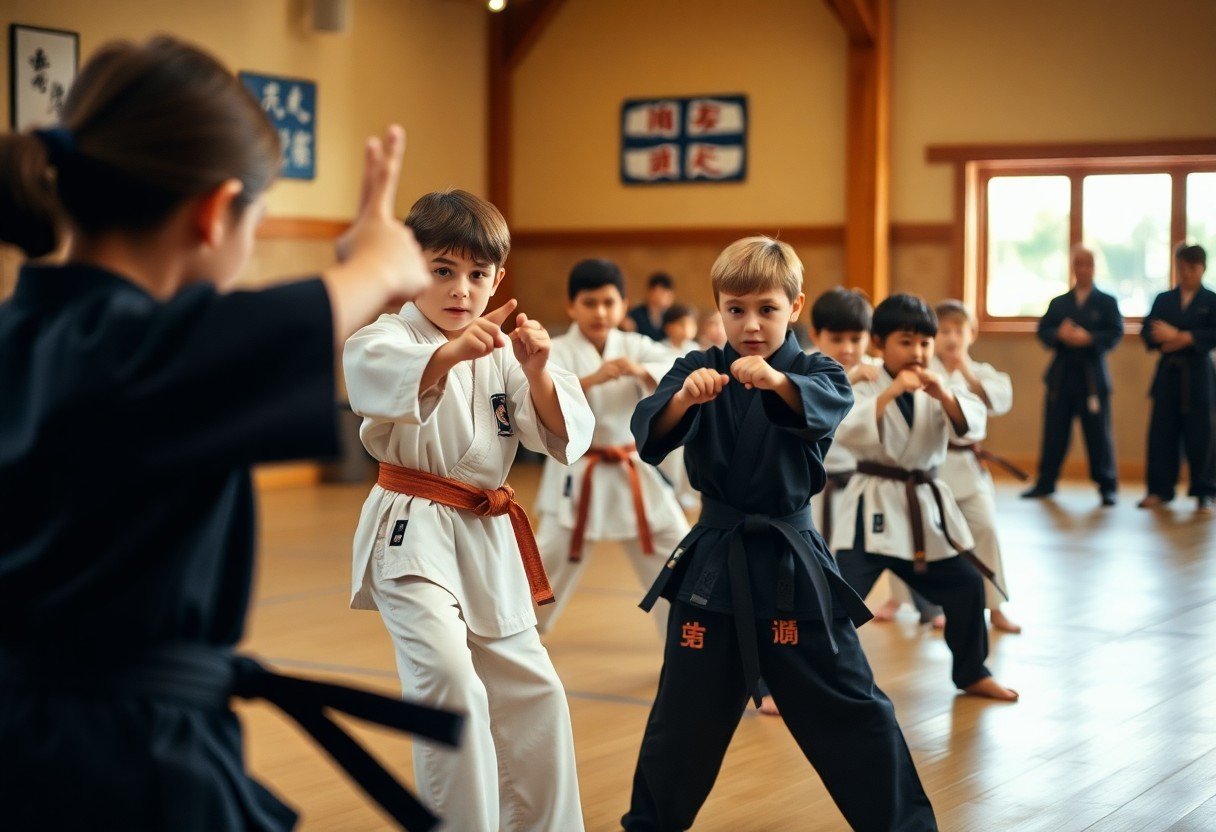Focus on how martial arts can significantly enhance your child’s discipline and focus. Through structured training and clearly defined goals, martial arts instils a sense of respect for authority and promotes self-control. As your child learns techniques and participates in sparring, they develop a strong work ethic and the ability to concentrate amidst distractions. Alongside physical fitness, martial arts cultivates mental resilience and perseverance, crucial traits that will benefit your child both inside and outside the dojo. Engage in this empowering journey to foster lifelong skills that will shape your child’s character.
Understanding Discipline in Martial Arts
While engaging in martial arts, you will find that the concept of discipline is woven into every aspect of training. It is not merely about physical prowess; rather, it emphasizes the importance of mental focus, self-control, and respect for others. Through consistent practice, you will learn that discipline enhances your capabilities, allowing you to overcome challenges and achieve your goals in martial arts and life.
Definition and Importance
Before plunging into techniques, it’s necessary to comprehend what discipline truly means in the context of martial arts. Discipline refers to the practice of training oneself to adhere to a code of conduct and the consistent application of effort in your training. This quality is paramount, as it aids in building resilience, fostering respect for instructors and peers, and cultivating a strong work ethic.
Techniques to Cultivate Discipline
Below are several techniques that can help you develop unwavering discipline in your martial arts journey. Establishing a regular training schedule is key, as it lays the foundation for your commitment. Setting specific, measurable goals allows you to track your progress and stay motivated. Additionally, practising mindfulness during training sessions helps you maintain focus and enhances your understanding of techniques.
Considering the various methods available, you can also integrate visualisation techniques to mentally rehearse movements and strategies, strengthening your capacity for focus. Setting realistic deadlines for your goals can create a sense of urgency, propelling you to action. Furthermore, embracing accountability through partnerships or classes can foster a supportive environment where discipline flourishes. By implementing these techniques, you’ll be equipped to navigate challenges both on and off the mat.
The Role of Focus in Martial Arts
There’s no denying that focus plays a vital role in martial arts training. When you engage in these disciplines, you’re not only honing your physical skills but also developing your mental acuity. Understanding how martial arts teach discipline encompasses recognising the importance of your concentration and attention during practice.
Concentration Techniques
Concentration during martial arts training requires you to channel your energy effectively. Techniques such as setting specific goals for each session or visualising your movements help you maintain focus. By identifying and minimising distractions, you can enhance your performance and learn to be present in the moment.
Enhancing Mental Clarity
Any form of martial arts training fosters greater mental clarity. As you become more adept at focusing on your movements, you sharpen your ability to think clearly. This increased clarity can translate into improved decision-making skills and a heightened awareness of your surroundings, both in and out of the dojo.
This enhanced mental clarity is invaluable in daily life. As you train, you cultivate a sense of self-awareness and confidence that positively affects your interactions. You’ll learn to effectively assess situations, allowing you to respond rather than react, which can be particularly beneficial in high-pressure scenarios. Ultimately, the focus gained from martial arts not only impacts your techniques but also strengthens your mental resilience and overall well-being.
Benefits of Martial Arts on Children’s Development
Any child who engages in martial arts training can experience significant benefits to their overall development. This practice fosters not only physical fitness but also important life skills such as discipline, perseverance, and respect for others. Through structured training, children learn to set goals, manage their time effectively, and cultivate a strong sense of focus which can translate into academic success and personal growth.
Emotional Regulation
Emotional regulation is a vital skill developed through martial arts training. As children learn various techniques and routines, they become adept at controlling their emotions and responses. This discipline helps them navigate challenging situations, reducing instances of frustration and aggression while promoting resilience and calmness in the face of adversity.
Confidence Building
Behind the physical training of martial arts lies a powerful tool for boosting your child’s self-esteem. As they progress and master new skills, you will notice a radical improvement in their confidence levels.
Arts teach children to set and achieve personal goals through consistent practice and dedication. This journey fosters a sense of accomplishment, as they repeatedly face challenges head-on and emerge victorious. The supportive environment of martial arts encourages them to step outside their comfort zone, leading to a fortified self-image and belief in their abilities. Moreover, the recognition they receive for their efforts from instructors and peers further enhances their confidence, preparing them to tackle obstacles in other areas of life.
The Impact of Structured Training
After engaging in structured martial arts training, you will notice a profound shift in your child’s discipline and focus. This type of training introduces a systematic approach that encourages learners to adhere to established routines, which fosters a sense of responsibility and accountability. The benefits extend beyond the dojo, positively influencing your child’s behaviour and performance in various aspects of their life.
Routine and Consistency
Structured training creates a reliable environment where your child can develop routine and consistency. By participating in regular classes, they learn to manage their time effectively, establishing a sense of order that enhances their focus. Over time, these practices contribute to better self-discipline, as consistent training emphasises the importance of persistence and commitment.
Goal Setting and Achievement
Structured training promotes a strong sense of goal setting and achievement in your child. As they progress through different belts and techniques, they learn the value of working towards specific objectives. This not only boosts their confidence but also instills a belief in their ability to overcome challenges.
In fact, setting and achieving goals in martial arts empowers children to take ownership of their progression. Each new belt represents a milestone, showcasing their dedication and hard work. Furthermore, these achievements lead to increased self-esteem, motivating your child to pursue further challenges both in martial arts and in other domains of life. By recognising their ability to face difficulties, they develop a resilient mindset that serves them well beyond their training sessions.
Encouraging Overall Well-Being
Keep in mind that engaging your child in martial arts promotes overall well-being, nurturing both the mind and body. This holistic approach aids in developing a balanced lifestyle, where mental clarity complements physical vitality. As your child learns to meditate, control their breathing, and manage stress, they cultivate resilience and emotional stability, ultimately leading to a healthier, more fulfilling life.
Physical Health Benefits
An active routine in martial arts significantly enhances your child’s physical fitness. Through various techniques and drills, they will develop strength, flexibility, and stamina, which contribute to better overall health. This heightened physical condition also reduces the risk of obesity and other health-related issues, encouraging lifelong healthy habits.
Social Skills and Teamwork
Well-being is not solely about physical health; it also encompasses your child’s ability to interact positively with others. Martial arts fosters social skills and encourages teamwork, allowing your child to build friendships and connections in a supportive environment. They learn to communicate effectively, share experiences, and work towards common goals.
Indeed, as your child trains alongside peers, they actively engage in collaborative exercises that reinforce the importance of working as a team. This shared experience builds camaraderie and a sense of belonging, which can be particularly beneficial for children who may struggle with social interactions. Additionally, learning to respect others and appreciate diverse abilities fosters empathy and understanding. As a result, your child not only improves their martial arts skills but also becomes a more well-rounded individual, equipped with imperative social skills that will aid them throughout their life.

Choosing the Right Martial Arts Program
Not all martial arts programmes are created equal, so it’s important to find one that aligns with your child’s needs and interests. Explore various options and consider the 9 benefits of martial arts for kids who learn and think differently to make an informed decision.
Different Styles and Approaches
Before you choose a programme, it’s vital to understand the different styles and approaches available, such as Karate, Taekwondo, jiu-jitsu, and more. Each martial art offers unique techniques and philosophies, so selecting the one that resonates with your child’s personality is key.
Factors to Consider for Children
Above all, several factors should influence your choice of martial arts programme for your child. Consider the following:
- Age appropriateness of the classes.
- Instructor experience and teaching style.
- Class size and student-to-teacher ratio.
- Safety measures and the environment of the dojo.
Perceiving these factors will help you provide a safe and supportive environment for your child.
Right consideration of the above elements ensures your child has a positive experience. Focus on the age suitability of the classes to ensure engagement, evaluate the instructor’s qualifications for effective learning, and check the class size for personal attention. Prioritising safety measures in the dojo will protect your child during their training journey. Perceiving these aspects will lead to a rewarding martial arts experience.
Final Words
Conclusively, engaging your child in martial arts can significantly enhance their discipline and focus. Through structured training and a clear set of goals, your child will learn the value of perseverance and self-control. The repetitive nature of martial arts practice encourages concentration, helping them to pay closer attention in other areas of their life, such as schoolwork. By instilling these core values, you equip your child with important skills that will benefit them long after they leave the dojo.
FAQ
Q: How do martial arts teach discipline to children?
A: Martial arts training requires regular attendance, practice, and adherence to a structured set of rules and protocols. As children engage in these activities, they learn the importance of commitment and responsibility. The repetitive nature of martial arts exercises helps to instil a sense of routine, leading to improved self-discipline as children work towards their goals, such as advancing through belt ranks.
Q: In what ways do martial arts enhance a child’s focus?
A: Martial arts demand concentration and mental clarity to perform techniques correctly and safely. During training, children are encouraged to focus on their movements, instructions from their instructors, and their overall performance. This intense concentration helps to sharpen their mental faculties, leading to improved focus not just in martial arts, but also in other areas of their lives, including schoolwork and personal tasks.
Q: Can martial arts training help with a child’s confidence and self-esteem?
A: Yes, martial arts can significantly boost a child’s confidence and self-esteem. As they progress through techniques and belt ranks, children experience a sense of achievement. This success, combined with the supportive environment of martial arts classes, encourages them to believe in their abilities. Over time, this enhanced self-confidence translates into more positive interactions in social and academic settings.
Q: What age is suitable for a child to start martial arts training?
A: Many martial arts schools offer classes for children as young as three years old. However, the ideal age can vary depending on the child’s physical and emotional maturity. Typically, starting martial arts training around the ages of five to seven allows children to begin developing discipline and focus effectively. It is important to find a school that offers age-appropriate classes and a nurturing environment.
Q: How can parents reinforce discipline and focus learned in martial arts at home?
A: Parents can support their child’s martial arts journey by encouraging the principles of discipline and focus at home. This may include setting routines for homework and chores, discussing the importance of perseverance, and celebrating their child’s achievements in martial arts. Involving children in goal-setting and helping them to break tasks into manageable steps can reinforce the skills they learn in their martial arts classes.



